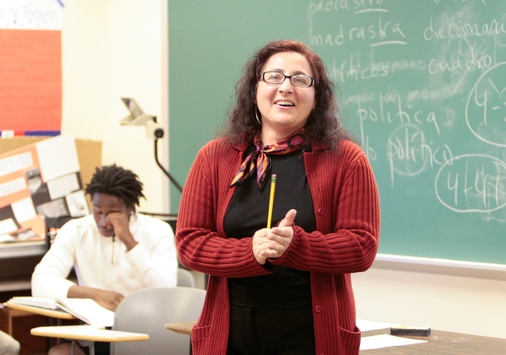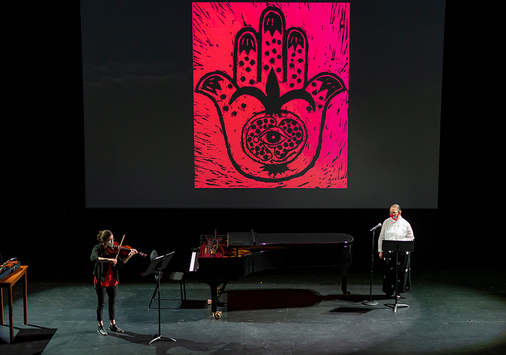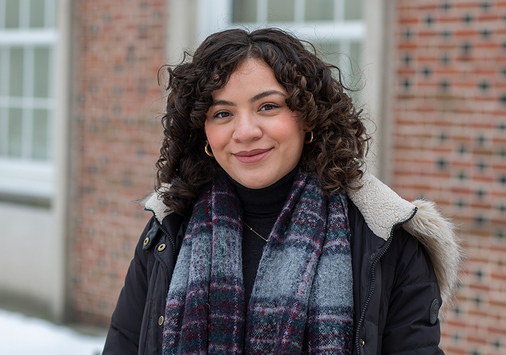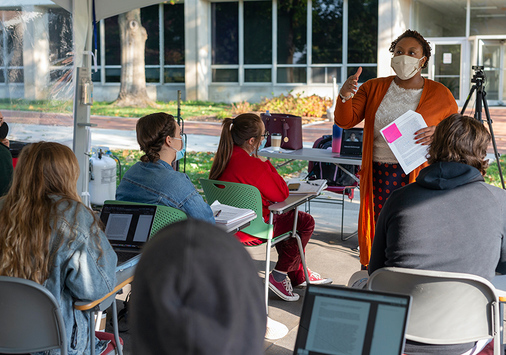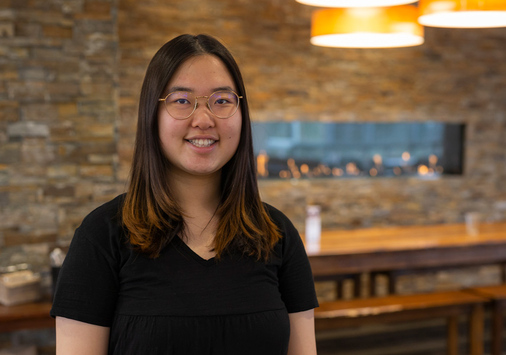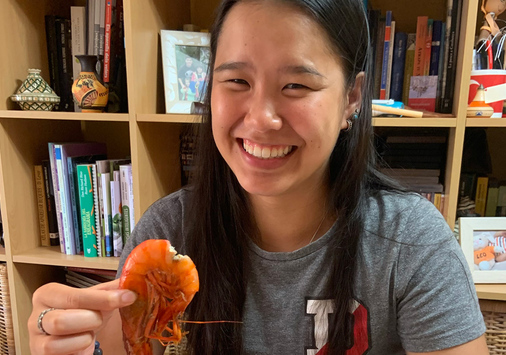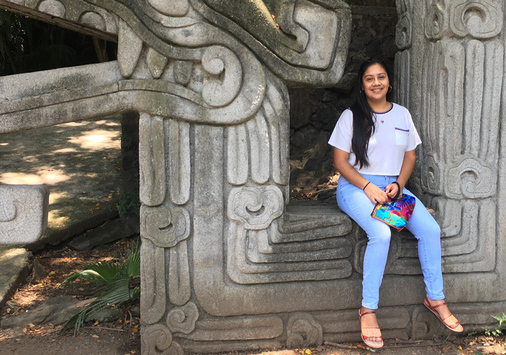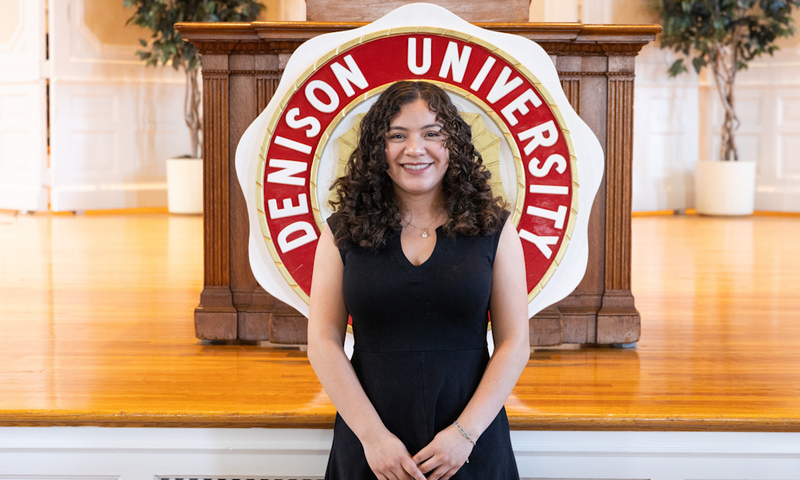Courses
2025 - 2026
For this academic year's course catalog, please visit our Academic Catalog site. For courses currently offered, please refer to the Schedule of Classes.
Students learn about the Spanish-speaking world while they start developing their Spanish linguistic skills in four basic areas (listening, speaking, reading, and writing). Students do a variety of written and oral activities that include formal and informal presentations, skits, short essays, etc. The course is conducted in Spanish.
Students continue learning about the Spanish-speaking world while they solidify their Spanish linguistic skills at the ACTFL novice level in the four basic areas (listening, speaking, reading, and writing). Students do a variety of written and oral activities that include formal and informal presentations, skits, short essays, etc. The course is conducted in Spanish.
Prerequisite(s): SPAN?111 or placement.
Students further their knowledge of the Spanish-speaking world while developing a functional comprehension and use of spoken and written Spanish at the ACTFL novice-high/intermediate-low level. The course solidifies grammar structures and emphasizes the acquisition of cultural knowledge about the Spanish-speaking world through a wide variety of visual and written texts. Conducted in Spanish.
Prerequisite(s): SPAN?112 or placement.
Students will enhance their proficiency in oral and written Spanish, in order to solidify a low-intermediate ACTFL level. Students will develop skills such as summarizing, comparing, contrasting and synthesizing. Students will practice communicational abilities through discussions, oral presentations, debates, reports and film reviews. Audiovisual materials, Internet based resources and cultural readings will be frequently used texts. Conducted in Spanish.
Prerequisite(s): SPAN?211 or placement.
Students develop their writing and analytical skills through an intensive writers¡¯ workshop, which includes linguistic, literary, and cultural analysis through grammar, readings, discussions, and essay. Students develop their writing through expository, argumentative, and analytical essay as well as other genres such as chronicle, journal, autobiography, and literary translation. Students will write, edit, and evaluate their work and that of their peers following models presented through readings organized around thematic units. Conducted in Spanish.
Prerequisite(s): SPAN?213 or placement or permission of instructor or department chair.
This course is a collaboration between ±Ø²©ÓéÀÖ,±È²©ÓéÀÖÍøÖ· ######### University and the Universidad Complutense of Madrid, and it is intended for students of SPAN?213, SPAN?215, and SPAN 300 levels. It is a 1-credit course that consists of regular conversations with native Spanish speakers, and it aims to help students acquire greater skills and confidence in both oral and written expression. Moreover, this course will promote the familiarization of the students with ACTFL¡¯s 5 Cs: Communication, Culture, Connections, Comparisons, and Communities. In this one-semester-long course, students can communicate with their peers from Madrid about topics related to their interests: movies, shows, pop art, traveling, sports, art, books, and more.
Prerequisite(s): SPAN?211 or waiver.
Students will enhance their skills in writing and composition through literary analysis, literary translation, and practice of the craft of writing in different genres (drama, poetry, short story) in the Spanish language. Using the close reading of great works of Hispanic literature in the above-mentioned genres, students will learn to translate literary texts and create literature of their own. Students will explore the process of writing, editing, and evaluating their work and that of their peers.
Prerequisite(s): SPAN?215 or consent of instructor or department chair; no course prerequisite if taught in English; when taught in English, no first-year students.
Have you ever heard a Spanish speaker in the United States say escuela alta, rufo, llamar para atr¨¢s o queik? Or have you heard someone switch from English to Spanish in the same sentence? What is Spanglish? Do you have a friend who doesn't know Spanish even though his parents speak it? Is Spanish a foreign language in the US? Have you ever heard someone say that we shouldn't speak Spanish here? The United States has a Hispanic population that is larger than most Latin American countries. But, unlike other Spanish-speaking countries, Spanish is a minority language in the US. In this class, we study various social and linguistic phenomena that arise from this situation. Among other topics, we analyze the history of Spanish in the US, the racialization of Spanish, language policy, Spanish in education, Spanglish, and Latinx identity.
Prerequisite(s): SPAN?215 or permission of the instructor.
This course combines two goals: improving students¡¯ Spanish pronunciation and introducing them to the study of phonetics. Through pronunciation practice, phonetic transcription, and acoustic analysis, students will learn how Spanish sounds are produced and organized, as well as how they differ from English. These tools not only help students develop clearer, more confident speech, but also provide a foundation for understanding linguistic analysis. Along with developing familiarity with the sound patterns characteristic of all Spanish dialects, students will gain the ability to recognize regional differences and to strengthen their pronunciation in a selected dialect.
Prerequisite(s): SPAN?215 or consent.
This course introduces students to the existing world of translation. Students work with written texts, transferring text from a source language into a target language (Spanish-English and English-Spanish). This is far more than replacing one word with another: the translator must also convey the style, tone, and intent of the text. Focus is on the actual process of translation: what the translator does and why. Students will work mostly with literary and journalistic texts. Students will gain an understanding of different cultural communication styles. Students will familiarize themselves with the relationship between language and power, and the role of the translator as the "in-between" agent.
Prerequisite(s): SPAN?215 or consent of instructor or department chair; no course prerequisites if taught in English; when taught in English, no first-year students.
Students will conduct an in-depth analysis of the Spanish grammatical system, which includes core areas of linguistics such as morphology, syntax, semantics, and pragmatics. Students will analyze the Spanish grammatical system in a wide variety of written and oral texts. For example, contrastive analysis will be used as a method of problem-solving. Spanish will be the medium of instruction as well as the content area. Written work and oral presentations in Spanish should be produced at the ACTFL intermediate-high level. Conducted in Spanish.
Prerequisite(s): SPAN?215 or consent of instructor or department chair; no course prerequisite if taught in English; when taught in English, no first-year students.
Students will analyze Spanish Literature from the Middle Ages to the Twentieth Century within its historical, sociocultural and artistic contexts. This course offers an overview of main literary periods, authors and genres. Students will examine a variety of texts and the outstanding characteristics of their authors. Students will engage in critical analysis of texts through research essays, creative projects and oral presentations, at the ACTFL intermediate-high level. Conducted in Spanish.
Prerequisite(s): SPAN?215 or consent of instructor or department chair; no course prerequisites if taught in English; when taught in English, no first-year students.
Was Inquisition an evil machine created by the Spaniards to terrorize the world? Did the Spanish Empire rule over half of the world through fear and punishment? Is Spain a barbaric country? Students will address these and other questions that arose during the 16th and 17th centuries in Europe to analyze the expansion of the Spanish Empire. In this class, we will study different power relationships between Spain and Latin America and, Spain and Europe. Through historical, literary and cultural texts students will analyze the myth known as "The Black Legend" and learn about different social and political structures and discursive strategies that sustain power. Students will also explore how these have been transformed and survive nowadays.
Prerequisite(s): SPAN?215 or consent of instructor or department chair; no course prerequisite if taught in English; when taught in English, no first-year students.
Islamic Spain was a place where ancient and new communities encountered and transformed each other. Known in the Middle Ages as al-Andalus, it continues to occupy the cultural and political imaginations of Spain and the Arab world. This class explores al-Andalus through what defines it in scholarly and popular discourse: its religious communities and the cultural contact and synthesis characterizing them. By placing medieval Spain or ¡°Iberia¡± into its Mediterranean context, the class traces the development of Jewish, Christian, and Muslim communities from their beginnings in the eastern Mediterranean and their settlement in Iberia up to the diasporas in the Mediterranean region today. Rather than essentializing religion, we place it in dialogue with language and culture, tradition and innovation. As a writing-intensive seminar, students will engage the cultural and historical themes of the class through writing in daily discussion posts, in-class reflections, midterm essays, and a phased research project on a theme chosen by the student. The course is closed to first-year students.
Prerequisite(s): SPAN?215 when taught in Spanish, none when taught in English.
Crosslisting: MENA?324.
Students will analyze texts from Pre-Columbian times to the present within their historical, sociocultural and artistic contexts. This course offers an overview of main literary periods, authors and genres. Students will examine a variety of texts and the outstanding characteristics of their authors. Students will engage in critical analysis of texts through research essays, creative projects and oral presentations, at the ACTFL intermediate-high level. Conducted in Spanish.
Prerequisite(s): SPAN?215 or consent of instructor or department chair; no course prerequisites if taught in English; when taught in English, no first-year students.
Crosslisting: LACS?325.
This course will explore different representations of dictators and dictatorships throughout the history of Latin American literature. It will trace distinctive images of this figure in Latin American cultures, beginning with the separation between civilization and barbarism during colonial times, the presence of the caudillo in the 19th century, and ending with contemporary images of the dictator in the 21st century.
Prerequisite(s): SPAN?215, consent or placement.
Crosslisting: LACS?326.
Students will analyze how the different people of Spain conceive of and represent themselves, their attitudes, values, and beliefs. Through a multidisciplinary approach, students will explore questions about national and regional identities, religious and ethnic communities, cultural movements and institutions, canon formation, and popular culture. Following a historical perspective, students will examine the evolution of institutions, traditions, and various artistic endeavors. Historical, cultural, and philosophical texts will be the basis of this class. Students will hone the skills of interpreting, relating, categorizing, and critiquing cultural works and periods. Students will write analytical essays, present oral reports, and take exams as part of the course evaluation. Students will achieve an ACTFL intermediate-high level. Conducted in Spanish.
Students will analyze selected historical themes such as revolution, gender and sexual politics, Southern cone dictatorships, human rights, and memory. Students will work with a variety of texts: films, testimonies, performance art, and fine arts. Students will engage in critical analysis of texts through research essays, creative projects and oral presentations, at the ACTFL intermediate-high level. Conducted in Spanish.
Prerequisite(s): SPAN?215 or consent of instructor or department chair; no course prerequisites if taught in English; when taught in English, no first-year students.
Discover the vibrant performance practices across the Americas! This course explores how theater and performance in Latin America and Latinx/a/o communities have shaped social and political realities from the colonial era to today. Through readings, videos, and critical analysis, we examine avant-garde theater, community activism, street performance, and more, tackling key themes like colonialism, revolution, gender, borders, and cultural identity. You might even get to visit a regional theater festival!
Prerequisite(s): SPAN?215 or consent of instructor.
Crosslisting: LACS?338.
Students will engage in an in-depth study of selected topics in the frame of the Atlantic World, which addresses the relations between the cultures of Peninsular Spain and Latin America from a transatlantic perspective. Students will question Western systems of thought, will interrogate structures of power and will develop new connections to the realities of the Hispanic World. Students will summarize, compare and contrast, synthesize and evaluate cultural themes, actors and events. Students will hone their research skills and will demonstrate them through oral presentations, in-depth discussions, creative work, research papers, poster sessions, webspaces, and wikis that meet the ACTFL intermediate-high/advanced-low level standards. Conducted in Spanish.
Prerequisite(s): SPAN?215.
This course will explore the nature of creativity through the works of seven groundbreaking Spanish artists across multiple disciplines: Picasso, Dal¨ª, Maruja Mallo, Arrabal, Bu?uel, Almod¨®var, and Calatrava. It will examine how their innovations reshaped artistic norms, challenged cultural conventions, and redefined creativity itself. The curriculum raises thought-provoking philosophical questions about creativity, such as the impact of cultural background on creativity, the role of failure in artistic innovation, the balance between originality and constraints, how societies define and value creativity differently, and the connection between storytelling, social change, activism, and ethical responsibility.
Prerequisite(s): SPAN?213 and SPAN?215.
A student in good standing may work intensively in areas of special interest under the Directed Study plan. A Directed Study is appropriate when, under the guidance of a faculty member, a student wants to explore a subject more fully than is possible in a regular course or to study a subject not covered in the regular curriculum. A Directed Study should not normally duplicate a course that is regularly offered. Directed Studies are normally taken for 3 or 4 credits. A one-semester Directed Study is limited to a maximum of 4 credit hours. Note: Directed Studies may not be used to fulfill General Education requirements.
A student in good standing may work intensively in areas of special interest under the Directed Study plan. A Directed Study is appropriate when, under the guidance of a faculty member, a student wants to explore a subject more fully than is possible in a regular course or to study a subject not covered in the regular curriculum. A Directed Study should not normally duplicate a course that is regularly offered. Directed Studies are normally taken for 3 or 4 credits. A one-semester Directed Study is limited to a maximum of 4 credit hours. Note: Directed Studies may not be used to fulfill General Education requirements.
Independent Study engages a student in the pursuit of clearly defined goals. In this effort, a student may employ skills and information developed in previous course experiences or may develop some mastery of new knowledge or skills. A proposal for an Independent Study project must be approved in advance by the faculty member who agrees to serve as the project advisor. Note: Independent Studies may not be used to fulfill General Education requirements.
Independent Study engages a student in the pursuit of clearly defined goals. In this effort, a student may employ skills and information developed in previous course experiences or may develop some mastery of new knowledge or skills. A proposal for an Independent Study project must be approved in advance by the faculty member who agrees to serve as the project advisor. Note: Independent Studies may not be used to fulfill General Education requirements.
This course explores Latine and Chicanx women's health through feminist theories and methodologies. Key thinkers like Gloria Anzald¨²a and Cherr¨ªe Moraga guide our critique of the socio-cultural constructions of women's bodies and health, promoting an understanding of bodily autonomy, reproductive rights, and intersectional healthcare. Assignments will involve analyzing Latine/Chicanx cultural texts (literature, art, film, media) through a feminist lens, considering how social and cultural factors shape narratives around women's health. We'll examine the diverse experiences of women, especially focusing on race, class, sexuality, and nationality within Latine/Chicanx communities. The course includes comparative studies of cultural representations and acknowledges the importance of localized, community-specific studies to avoid overgeneralizations. Content is grounded in Latine/Chicanx feminist scholarship, encouraging students to engage critically with readings and case studies from leading feminist scholars and artists. The course is conducted in Spanish.
Prerequisite(s): SPAN?215 or placement or permission of the instructor.
Crosslisting: LACS 381 and WGST 383.
This seminar explores oral narrative and storytelling through the lens of folkloristics and cultural studies, which provide an interpretative framework to answer the following questions: What is the nature of narrative and its relation to culture? How is narrative constituted by and constitutive of its cultures of origin, and how does it function within its home cultures? In addition to reading (and listening) to primary texts from Spain, Latin America, and Morocco, students will learn the theoretical paradigms of folkloristics and cultural studies as well as tools available to the researcher. Finally, students will select a tale type from the regions studied and map its variation across space/time via ArcGIS StoryMaps. Taught in Spanish.
Prerequisite(s): SPAN?215 or consent by instructor.
This course investigates representations of 'bad girls' in Spanish and Latin American cinema. It examines how these films depict women who defy cultural gender norms, using feminist and queer theory to analyze the complex interplay of gender and power. Students will enhance their film analysis and research skills through presentations, discussions, and multimedia projects that meet the ACTFL intermediate-mid/intermediate-high level standards. Conducted in Spanish. Please note: Fridays will be dedicated only to mandatory film viewings.
Prerequisite(s): SPAN?215.
Crosslisting: DH?283.
As posited by film scholars such as Jean-Louis Comolli, the history of cinema has been in large part the history of the twentieth century. This is particularly true in Latin America, where it has been associated with national projects of modernization following the establishment of independent republics throughout the nineteenth century. In Mexico in particular, cinema has played a central role in nation-building, making it an ideal venue for the exploration of the relationship between film and ideals of nationhood. How are these ideals articulated through family relations, encounters with gringos, indigenous vs. European worldviews, rural vs. urban space, etc.? Students will engage in critical analysis of texts through research essays, creative projects, and oral presentations at the ACTFL intermediate-high level. Conducted in Spanish.
Prerequisite(s): SPAN?215.
Crosslisting: LACS?385.
This seminar integrates the two core courses, the six 300-level courses, and the off-campus experience into a culminating research project. It focuses on theoretical tools, frameworks and methodologies in Hispanic Cultural and Linguistic Studies. This seminar emphasizes the development of independent research skills and scholarly writing in connection with a research project based on individual students' interests in cultural artifacts from the Spanish-speaking and Latino worlds.
Prerequisite(s): SPAN?213, SPAN?215, and at the 300 level, any six courses (electives).
Students may enroll in Senior Research in their final year at ±Ø²©ÓéÀÖ,±È²©ÓéÀÖÍøÖ· #########. Normally, Senior Research requires a major thesis, report, or project in the student's field of concentration and carries eight semester-hours of credit for the year. Typically, a final grade for a year-long Senior Research will not be assigned until the completion of the year-long Senior Research at the end of the second semester. Each semester of Senior Research is limited to a maximum of 4 credit hours. Note: Senior Research may not be used to fulfill General Education requirements.
Students may enroll in Senior Research in their final year at ±Ø²©ÓéÀÖ,±È²©ÓéÀÖÍøÖ· #########. Normally, Senior Research requires a major thesis, report, or project in the student's field of concentration and carries eight semester-hours of credit for the year. Typically, a final grade for a year-long Senior Research will not be assigned until the completion of the year-long Senior Research at the end of the second semester. Each semester of Senior Research is limited to a maximum of 4 credit hours. Note: Senior Research may not be used to fulfill General Education requirements.


